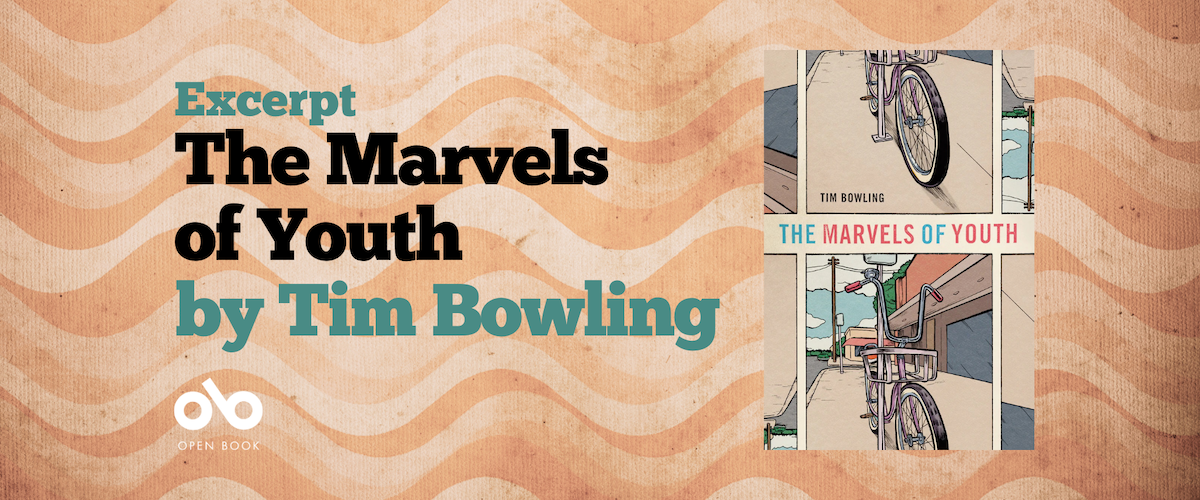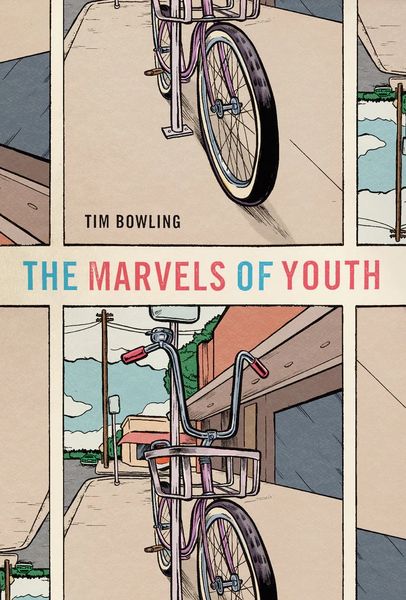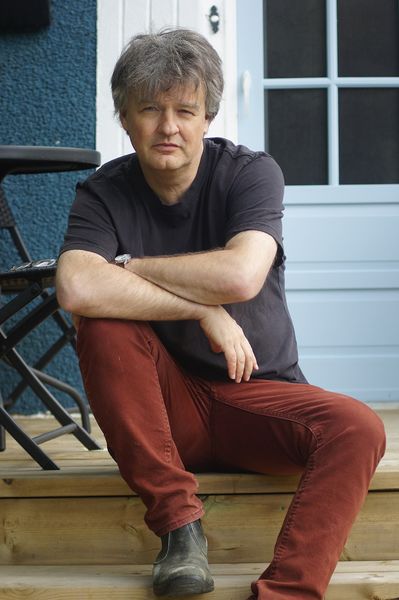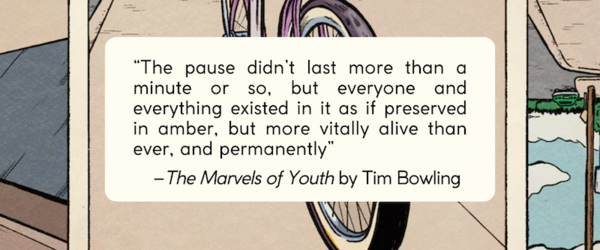Read an Excerpt from Tim Bowling's Raw & Atmospheric Return to the 1970s, The Marvels of Youth
The Vietnam War, hippies, Watergate. The mid-to-late 70s were a time of turmoil and change, and the last days of a pre-Reaganomics, tech-boom world that was lurking around the corner, with Star Wars: A New Hope released in 1977 and Apple computers founded in 1976.
It's against this shifting, dynamic backdrop that Tim Bowling sets The Marvels of Youth (Wolsak & Wynn), a atmospheric and evocative but unsentimental portal back to the landscape of childhood as it existed some 50 years ago.
When Sean, now an adult, hears that the owner of the local comic bookstore in his hometown has died, he's transported back to 1975 – a year when he inadvertently stirred up tensions in his working-class town by stumbling upon a mystery. Filled with striking workers pitted against scabs, kids riding bicycles as the streetlights come on, and the swirling tension of secrets, poverty, and coming of age, The Marvels of Youth is an epic tale spun by master storyteller.
We're excited today to share an excerpt from The Marvels of Youth by Bowling, one of the country's most prolific and decorated writers and the author of more than 22 books of fiction, nonfiction, and poetry. In this section, we get a glimpse into the dynamics of both Sean's family and his fractured town in a moving passage set near the Fraser River, which runs through and defines the region in which Sean grew up.
Excerpt from The Marvels of Youth by Tim Bowling:
My brother drifted into position, but near our cousins and not our father. My uncle also took a place, but at one end, near the far bank, no doubt hoping to avoid any possible conflict. The river wouldn’t open for nearly two hours, but the blockade had to be set up well in advance, in case any scabs tried to sneak out early. Often, fishermen would anchor on the rifts the night before a big opening, but the union, anticipating this move, had sent out night patrols.
“I don’t see my dad,” Keith said, and the hope in his voice almost made him breathless.
But my attention was focused on a single black gillnetter that drifted to within ten fathoms of the blockade, bow first, its slimy old car tires hanging from ropes off the gunwales, its mast without any kind of flag, its cabin windows and portholes more like knots in a tree trunk than glass for seeing through. Bullet was already in the bow, barking nonstop at the line of boats, and within a minute Edgar had darted out of the cabin and – to my astonishment – dropped into a seat that he’d positioned in the middle of the bow. And not just any seat, but the one he’d scavenged from the rubbish heap when the cinema had been razed. It looked exactly as if he’d decided to watch a movie, but one that he could stand up and join at any second.
“What’s he doing? Is he going to try to get through?” Keith, every bit in the dark as I was about Edgar’s possible behaviour during a strike, sounded relieved to have someone other than his father to focus on.
But I couldn’t take my eyes off Bullet. Despite his usual feistiness, he seemed vulnerable to me, as if he’d drop dead before the next bark, destroyed from the inside. It was horrible to listen to him and watch him, expecting the worst. But then I realized, if Edgar didn’t join the blockade, and since he hadn’t been in the crowd at the union meeting, Kirkhoff couldn’t possibly suspect him as the union member who’d killed his dogs.
The relief I felt didn’t last, because the longer Edgar kept his boat pointed at the other boats, the more the morning tightened like a bow string, with Edgar the wildly unpredictable arrow. When the engines had all stopped revving, and many had been shut off, the voices of Edgar and the other fishermen could be heard clearly over the hammered-silver channel.
Your CanLit News
Subscribe to Open Book’s newsletter to get local book events, literary content, writing tips, and more in your inbox
“You gonna scab now, Eddy? Can’t pay off that fancy new boat if you don’t, eh?”
“There’s a few boats already gone,” Edgar said gleefully. “You buggers gettin’ blind as bats goddamn ya.”
“Ah, so what? Where’s anybody going to set that we can’t see?”
“Got the whole river covered, do you? Looking down every slough?”
“Don’t you worry about what we’re doing. Worry about what you’re doing, you silly bastard. What are you playing at now anyway? King of the goddamned river?”
Edgar straightened up in his seat, uncrossing his legs. I couldn’t see his grin, but if it’s possible to hear an expression or to read it through the movement of the rest of the body, then the grin was as apparent as a hand clap.
“I need a good seat to watch all the Adams go by that you’re not going to catch.”
“And you think you’re going to, eh? Big brothers talked you into it, did they?”
I hadn’t noticed before, but now, scanning the line, I realized that Edgar’s brothers’ large northern gillnetters weren’t part of the blockade.
But Edgar’s characteristic response – half witch’s cackle, half hyena laugh – brought my eyes back to his boat. It was possible he’d remain there all day, just watching, and equally possible that he’d dart back into his cabin and suddenly gun his engine and ram straight into the other boats.
In the end, it was my father who broke the tension. He simply idled out of the line and drifted alongside Edgar’s bow. I couldn’t hear the words exchanged, but Edgar’s posture loosened as my father stood on his main hatch cover, waving at one point back toward town. Edgar stood up then, and, wiping the back of his forearm across his eyes, gestured my father onto the bow with his other hand.
Then something strange yet very ordinary happened. My father removed his skullcap, bowed his head for several seconds and slowly lowered himself into the cinema seat. The whole time this scene played out – lasting several minutes – all the other fishermen remained silent. Even Bullet stopped barking. I could hear the trickle of the current fifteen feet below the dike, and Keith’s even breathing right beside me.
The town hadn’t stirred yet. It was as if the town no longer existed. My father, who I’d never known to go to a movie theatre, didn’t look the way other people did sitting in such a seat. He seemed altogether too stiff, and the angle of his head would have carried his gaze far above any imaginary screen. At his side, Edgar also looked awkwardly formal, his arms like leaded ropes, his face pointed down.
I had an urge to turn and look up to where my father was looking, but I couldn’t take my eyes off the two men, Edgar standing like a guardsman beside my father’s regal stillness.
“What’s going on?” Keith whispered. “What are they doing?”
I shook my head, feeling strangely calm despite my confusion. Something as great and mysterious as the river itself had pervaded the morning, something that could be sensed but not comprehended.
When, at last, my father rose, and put his arm around Edgar’s shoulders, and both men retreated to their cabins and their boats began to move, my father’s back into the line and Edgar’s back to his float opposite the government wharf, I understood only that time had stopped. The pause didn’t last more than a minute or so, but everyone and everything existed in it as if preserved in amber, but more vitally alive than ever, and permanently.
Nothing else of note happened that morning – nothing could have happened – before the gulls on the main net shed roof returned the hours to their raucous and ravenous appetite, and all the shops and houses in the town behind me began to open and close their doors like gills...
I found him busy at his hanging bench in the pear tree shade, where he now spent so much time that he might have been making a new net from scratch rather than mending a torn one. But our family rarely trafficked in newness... “What happened between you and Edgar at the blockade? Why did you go and sit in that theatre seat?”
My father froze. The muscles tightened in his neck and jaw. He didn’t turn to me for several seconds, and when he did, I was shocked to see the beginning of a mist in his pale eyes. All at once, as he began to speak, the strength drained out of his body. His shoulders slumped. His arms hung limp. The grizzle on his cheeks might have been lead filings, for it appeared a challenge for him to keep his head lifted.
“Your grandmother was a very caring person. Too caring for this place.”
Something in the tone of his voice made me aware that he wasn’t just talking about our town. He seemed to have drifted away from it himself, the shade beneath and around the hanging bench suddenly bottomless and much colder.
“She used to take Edgar to the movies. When he was a little boy. Every weekend. During the week, too, when she could find the money. It was the best she could do for him. Oh I have no doubt she’d have adopted him if she could, just to get him away from that house. But... it’s strange... I don’t think he’d have gone. There’s something about family, even when it’s wrong, a kind of hold that’s not just from the outside.”
My father’s face had drained of colour but he had fought back any tears. His eyes, however, were a paler blue than I’d ever seen, almost without blue at all.
“She cleaned up his cuts and bruises at least, so he could go to school and not make the teachers too curious. Their interest wouldn’t have done any good. If Edgar could choose his father over her, what chance would anybody else have had to help? She’d try to feed him, too, leave meals for him in some of the places she knew he liked to go, a shack in the marsh mostly. It puzzled us at the time. Bothered us, too, to be honest. Everyone thought the Winterbournes – except for the mother, and she’d been dead for years, died when Edgar wasn’t more than a few years old – weren’t worth anybody’s time or effort. But she’d say, ‘Charity begins at home,’ or ‘There but for the grace of God,’ or else just clamp her mouth shut, her way of telling us that we were invading her privacy. Later, I figured out that she needed Edgar as much as he needed her. Maybe even more. We were all grown, you see, and once your grandfather was gone, she must have just found herself at a loss. She had always done for others. It was her nature...”
My father’s voice broke and he lowered his gaze to his hands motionless in the meshes. When he spoke again, he didn’t look up; he didn’t even seem to be speaking to me, but to himself, haltingly, putting words for the first time to an emotion that mostly reduces all language to trivial noise.
“When she died – after terrible, terrible suffering – it was... the thing was... I had never really understood what death meant. The war wasn’t like that. Losing people. Even if you didn’t admit it, even to yourself, there was always gratitude that you had survived. And losing my father... that was harder, but, of course, she was still there, and she had always made it her job to ease everything for us, even that, even when she must have been in great pain herself.
But when it came, she couldn’t do anything to make her loss easier. Once she was gone, and I knew that I would never hear her voice or look into her face again, it changed things. I would think, this pain... I can take it to her, she will know how to cope with it. Then I would remember, and it was like I was swimming and I just kept swallowing wave after wave of brine. Almost ten years ago, and it’s just the same. I think, when I’ve had a good opening on the river, wait until she hears about this. Or, I’ve had a bad day, and I can taste the exact flavour of the tea she’d make, as if I was still drinking it.”
He licked his lips but the effort must have been futile, for he kept speaking in the same unworldly, heavy way.
“Maybe it’s true what they say, that time heals some wounds. But not the biggest ones. Easier to put the guts back into a sockeye and get it to swim away. Edgar, you see, more than even my own brothers, understood. When the theatre shut down a few years back, that was... well, it wasn’t final. He could still go by there, and stand there, and remember, and call her back somehow. Maybe it was like he could see a movie of her in his head, I don’t know. But when they knocked it down, I suppose he needed something that he could keep with him that was more than what he remembered. If he could sit in one of those seats, out on the river, and look at the sky, maybe he could feel her there beside him, maybe the whole painful world could just be some sort of movie. And when it’s over, you know the big curtain will draw back again, and you’ll have your bag of popcorn and a couple of hours away from everything...”
_______________________________________________________
Excerpt taken from The Marvels of Youth by Tim Bowling, published by Wolsak & Wynn Ltd. Copyright 2023, Tim Bowling. Reprinted with permission.
Tim Bowling is the author of twenty-two works of fiction, nonfiction, and poetry. He is the recipient of numerous honours, including two Edmonton Artists’ Trust Fund Awards, five Alberta Literary Awards, a Queen Elizabeth II Platinum Jubilee Medal, two Writers’ Trust of Canada nominations, two Governor General’s Literary Award nominations and a Guggenheim Fellowship in recognition of his entire body of work.







